In this post, I will be focusing specifically on how to handle toddler biting, but many of these tips will work for other types of aggressive behavior such as hitting or kicking.
It can be disheartening if your child or a child in your care shows aggressive behavior. However, these behaviors are incredibly common particularly between 1.5-3 years old.
The part of the brain (pre-frontal cortex) that controls emotional regulation, reasoning, aggression, and self-control has not yet developed. So toddlers are truly unable to control their urges or express their feelings.
WHY Is My Child Biting?

It is important to understand the ‘why’ to figure out the best way to handle toddler biting. Sometimes the reason doesn’t seem to be clear or consistent.
In that case, you may start to see a pattern if you observe and jot down notes about your day and when the biting happens.
Here are some reasons for biting:
- Teething pain
- Oral-sensory stimulation/exploration
- Over-stimulation
- Anger/frustration
- Change in routine or home life (like a new baby or a move)
- Exploring Cause and Effect/Reaction seeking
- Self-defense
- Need to feel control
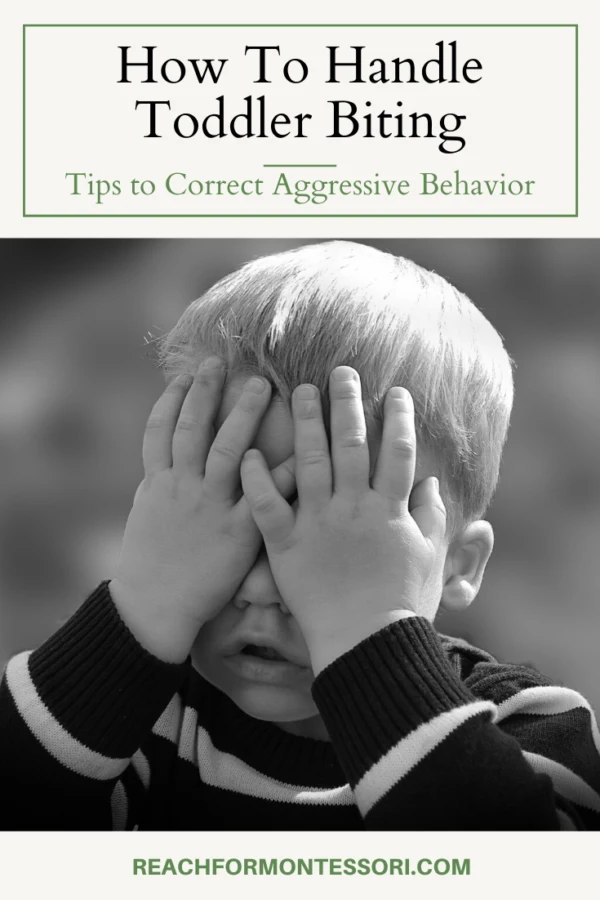
(This post contains affiliate links. Purchasing from these links costs you nothing extra, but sends a few cents our way for website upkeep.)
HOW To Handle Toddler Biting
Once you understand the ‘why', now you can figure out the best ways to correct the behavior. Keep in mind, some of these suggestions may not be appropriate for every age, stage and situation.
What To Do In The Moment
- Stay calm. It is important to not make a big deal out of it, keep your own emotions in check.
- Focus first on child bitten. Make sure they are okay, attend to bite if it’s severe.
- Use positive language. Instead of “no biting” say something that tells them what they should be doing. Some examples: “gentle hands,” “we bite food,” “teeth are for food,” “people are for hugging.”
- “Biting hurts.” At this age they don’t understand how their actions affect other people so it’s important to explain how they hurt someone. You may even show them the bite. If you were the one bit, you can say “you bit me, that hurt me.” Say it matter-of-factly and not overly emotional.
What to do everyday
- Transition Warnings. If you've discovered the issue is transitions, start giving warnings beforehand. A visual schedule of your day using picture cards can also be a very helpful tool.
- Positive Reinforcement. This is especially important if the biting is reaction-seeking. When you see children playing nicely together, sharing, using their words, etc., point it out. Try to avoid “good job” and over-praise. Please read Sue’s post here regarding this topic and for better wording.
- Chewing alternatives. There are a lot of sensory chewing necklaces or oral motor therapy tools to offer the child. At one time I was concerned that this would cause dependence on one of these tools, but I have seen a child use one for a short time and have total success.
- Autonomy. Helicopter parenting can sometimes cause anxiety and a power struggle, which could in turn cause aggressive behavior. The Montessori Method is wonderful for fostering autonomy. Just one example of this is Practical Life Skills.
- Practicing self-regulation. Montessori activities aide in this as well. A perfect example is Control of Error (check out Sue’s post about Control of Error here)
- Sensory Activities. Some children crave more sensory activities as a release. Add more messy play activities: fingerpainting, dirt, playdough.
Teaching Emotions and Communication
Providing the vocabulary and skills to communicate their emotions is important for every toddler, but it is especially vital in correcting aggressive behavior. Read more about improved Emotional Intelligence here.
- Speech Development and Communication. Here are some activities to encourage speech development. For older toddlers who have more words, you can encourage them to “use their words,” as a reminder before something escalates.
- Books. Introduce books about different feelings early and read them regularly. The Best Behavior book series, including “Teeth Are Not For Biting,” are great for these type behaviors. Check out the books at the bottom of this post.
- Emotion Activities. Make your own emotion photo cards or do some craft activities to make discussing feelings fun.
- Explain Feelings. Throughout your day, narrate feelings: “I see you’re sad/mad that Billy took the toy.” Narrate your own feelings as well. This is also known as Sportscasting.
Book recommendations to help with aggressive behavior/improve emotional intelligence:
- The Way I Feel
- The Pout-Pout Fish
- My Heart
- Indestructables: Baby Faces
- I am Human: Book of Empathy
- I am Love: A Book of Compassion
- Seeds and Trees
- Glad Monster, Sad Monster
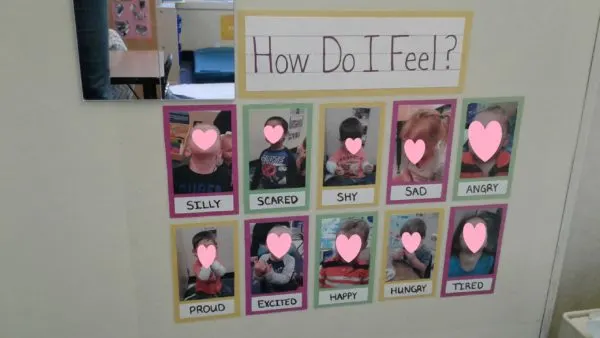
Other Things To Try
- Yoga. Start doing some simple yoga and breathing exercises with your child.
- Quiet Corner. Have a quiet, safe space in your home or classroom for children to go to when they’re getting overstimulated or upset. It should be cozy, and contain some sensory related items.
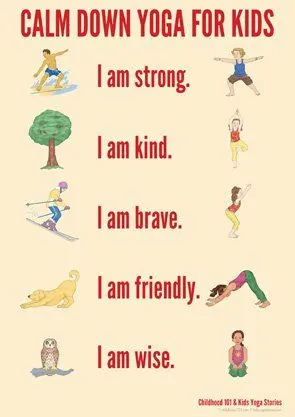
If your child is in daycare or preschool, have an open communication with the caregiver or teacher. It is important to be on the same page and have consistency with how it’s handled.
Things NOT To Do
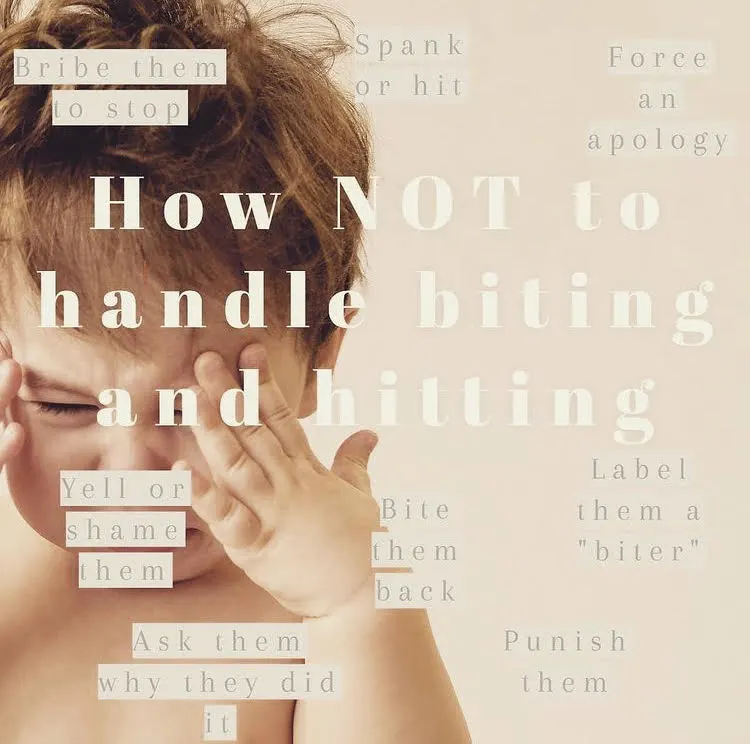
- Bite back. This is incredibly confusing and can potentially harm their trust in you. “Why does mommy or daddy get to bite me when they’re upset, but I can’t?”
- Punish/Time outs. This does not teach the child anything other than they are alone in their feelings and get punished for them.
- Yell or shame. Don’t use the words “bad” or “wrong.”
- Forced Apology. Making your child apologize only teaches them to lie to make someone feel better or to get themselves out of trouble. You cannot force empathy. If the word “sorry” is important to you, use it by modeling: “I'm sorry you were bitten.”
- Play or Pretend Bite. A toddler can't understand that it is okay to play-bite at home, but not with friends at daycare.
- Label child as a “biter.” One of my pet peeves! Labeling sets a child up for failure. If a behavior is expected from a child, good or bad, that’s what they will do.
- Reward System/Bribery. Your goal should be to teach what is right from wrong and to nurture problem solving skills. Bribery is not a long-term solution.
- Ask “Why?” Spoiler alert: you’re not going to get an answer out of a toddler. They are unable to understand and express why, so asking why just adds more stress to their developing brains. (To be honest, this is a tough one for me because it's such an impulse.)
- Spank/Hit – the American Academy of Pediatrics states spanking harms children. Trying to solve aggressive behavior with aggressive behavior makes no sense.
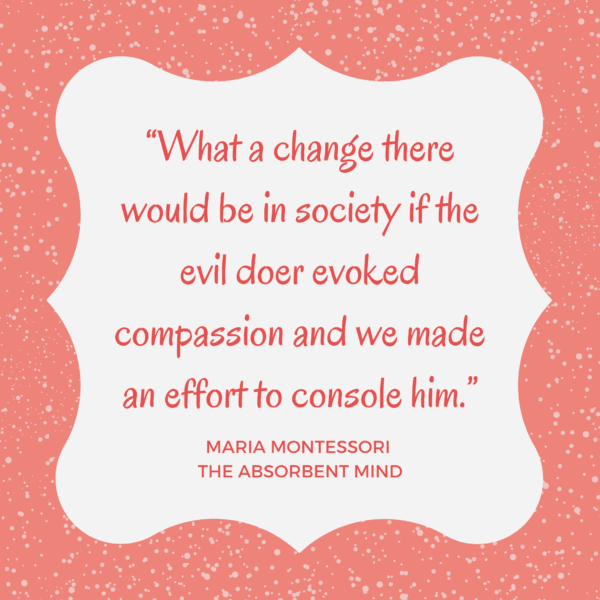
These methods will not fix things overnight, so remember to give it time and have patience with the toddler in your life.
If you are not seeing any improvement after some time, things seem to be getting worse or the biting is excessive, you should look into Early Intervention services (sometimes called Birth to Three or Zero to Three).
To find your state’s services, follow this link. Keep in mind these services need to be obtained before the child’s 3rd birthday.
I hope these tips have helped you feel confident that you can now handle a toddler biting. I’d love to hear any different phrasing you’ve successfully used or ways you’ve taught your children about their feelings.

Eileen Benson
Monday 6th of January 2020
I'm glad you mentioned that we should try to use positive language when discouraging our child from biting and focus on what teeth should be used for. My sister told me that her three-year-old daughter bit her on the arm yesterday. I want to find a book for her about how to stop children from biting, but the tips you shared here should be helpful for her in the meantime!
baccarat
Sunday 8th of December 2019
Best info you can get !
Ramon
Thursday 21st of November 2019
There are many times when your child's behavior warms and embraces your heart. But, there are other times when it probably drives you a little crazy. As a toddler or preschooler, your child may lack the self-control to express anger peacefully and may naturally lash out, perhaps hitting or biting in frustration. Teach the house rules. Children don't know the rules of the house until they're taught them, so that is one of your important parenting responsibilities. Toddlers are normally interested in touching and exploring, so if there are valuables you don't want them to handle, hide or remove them. Consider setting up a separate portion of your home where your child can play with books and toys. Whenever children break an important rule, they should be reprimanded immediately to understand exactly what they have done wrong.
Isabella
Sunday 10th of November 2019
Praise your child for appropriate behavior and help explain how grown-up she is acting whenever she uses these tactics instead of hitting, kicking, or biting. And always reinforce and praise behavior when you catch your child being kind and gentle. Control your own temper. Always watch your own behavior around your child. One of the best ways to teach him appropriate behavior is to control your own temper. If you express your anger in quiet, peaceful ways, your child probably will follow your example.
Jordyn
Sunday 10th of November 2019
This is so informative thank you for sharing! My child bit someone at school last month and I was so lost with how to handle it!